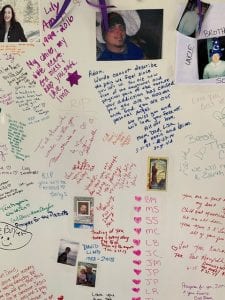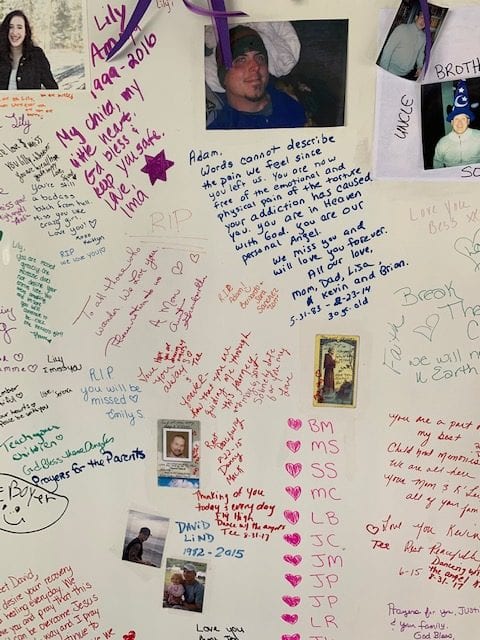
A small section of the Wall of Hope that was on display at Baystate Noble Hospital’s community awareness day on the opioid epidemic in May.
WESTFIELD – One of the regional earmarks in the $44.11 billion state budget, now in the hands of Gov. Charles Baker, is $100,000 to Baystate Noble Hospital for a grant program to prevent and treat opioid addiction and related substance abuse.
In conversations with state Sen. Donald F. Humason, Jr. and state Rep. John C. Velis this week about the funding, both acknowledge that the opioid crisis in western Massachusetts is not improving.
Humason said that the funding started in last year’s budget when Michael Knapik, vice president of government and community relations at Baystate Health, approached him about getting state money to help fight the opioid epidemic. At the time, Velis was deployed in Afghanistan. Humason said they put $50,000 into the budget, which was released three months ago.
This year, Velis was back from Afghanistan and put $100,000 in the new budget, which passed the House. “It will build upon the money we received last year,” Humason said.
The legislators met last week with the Mayor’s Drug Task Force, the first meeting with Kathi Catugno, who is now leading the Task Force under the Health Department. Also at the meeting were Mayor Brian P. Sullivan, Police Chief Lawrence Valliere, Fire Chief Patrick Egloff and Board of Health Director Joseph Rouse.
Humason said the funding in the budget is not for one specific purpose, but for a “whole toolbox of possible ways to treat the problem in the area.”
Both he and Velis said Baystate Noble can be supportive as the largest medical provider in the area, and is partnering with the community for the purchase of Narcan and training for first responders to offer medically assisted treatment for people who have an addiction.
“Baystate Noble has a stake in this thing. There are options for treatment,” Velis said.
“One of the things we talked about the other day is it’s hard to follow up with a person after they receive Narcan from the Fire Department or the Police Department, because there’s no money to do it,” said Humason. He said having a person follow up has shown to be effective in other places.
“The biggest problem for us is not enough treatment beds,” Humason said.
Recently, Velis wrote a column in The Westfield News, talking about the lack of treatment beds in western Massachusetts. He talked about a visit to the Stonybrook Treatment and Stabilization Center, the Section 35 program run by Hampden County Sherriff Nick Cocchi in Ludlow, which is the only one for men in western Massachusetts. Velis also said there are “zero” treatment beds for women in western Massachusetts, adding that both situations are “fundamentally unfair.”
Velis said the epidemic is a priority focus of his; a public health crisis with the numbers in Hampden County trending in the wrong direction.
“You can’t combat it in separate silos. The Task Force has to be intimately tied into the efforts of Sheriff Cocchi and District Attorney Anthony Gulluni. We need to ensure that the sheriff is someone at the table, (and that) Narcan is widely available,” Velis said.
Sullivan agreed. “We collectively need to continue working towards a solution to a crisis that needs constant attention,” he said.
Several weeks ago Velis participated in a ride along with the Holyoke Police Department, State Police, FBI and DEA Task Force. “I went out with them for three hours. Best experience I’ve had as a state representative,” he said
Velis said law enforcement is on the front lines combatting the crisis on the treatment side, prevention side and enforcement side. “It’s unbelievable what they do, how they do it; gives you an idea of how profound (the problem is),” he said.
“We’ve got a crisis that isn’t abating. We’re still losing lives on a daily basis. We need to continue expending resources on the crisis,” Velis said, adding that his focus is on prevention and treatment.
“My expectation for the $100,000 in terms of prevention and treatment, is that folks in Westfield will be on the receiving end of some of the prevention efforts at Baystate Noble,” he said.








